WCHB’s Robbie “D”: My Trip to “Magic Town” . . . A White Guy’s Journey to the Motor City In the spring of 1966, an 18-year-old dreamer from Pittsbu
WCHB’s Robbie “D”: My Trip to “Magic Town” . . . A White Guy’s Journey to the Motor City
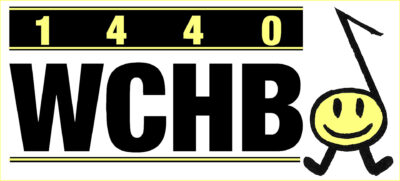 In the spring of 1966, an 18-year-old dreamer from Pittsburgh arrived in Detroit with a jazz-soaked heart, a voice built for soul, and a tape that defied expectations. His name was Robbie D.—or as Motor City listeners came to know him, Mr. Hip Lip, The Man With the Plan, The Master. For two and a half unforgettable years, Robbie lit up the airwaves on WCHB 1440, Detroit’s pioneering Black-owned soul station, becoming one of the most beloved and highest-rated DJs in the city’s history.
In the spring of 1966, an 18-year-old dreamer from Pittsburgh arrived in Detroit with a jazz-soaked heart, a voice built for soul, and a tape that defied expectations. His name was Robbie D.—or as Motor City listeners came to know him, Mr. Hip Lip, The Man With the Plan, The Master. For two and a half unforgettable years, Robbie lit up the airwaves on WCHB 1440, Detroit’s pioneering Black-owned soul station, becoming one of the most beloved and highest-rated DJs in the city’s history.
Robbie’s journey wasn’t just about music—it was about belonging. From his first electrifying public appearance at The 20 Grand to his genre-blurring shows at The Pumpkin Club, he proved that soul had no color and that radio could be a bridge, not a barrier. Whether introducing legends like Otis Redding or sharing the stage with Telma Hopkins, Robbie brought joy, unity, and a touch of aura to every mic he touched.
This tribute honors not just his voice, but his vision: a belief that people of all shades could come together, groove together, and build something beautiful. Detroit was his Magic Town—and Robbie D made it sing. — USA RADIO MUSEUM
_____________________
A Guest’s Essay: Robbie D. Reflects On His Amazing Time in Detroit, While on WCHB
“Hey! Baby! This is me! Rockin’ Robbie D! I’m so bad I make flowers die I make babies cry I take candies from babies and give dogs rabies and if that ain’t bad the rain don’t fall and that ain’t all — biscuits ain’t bread!”
“ Bad, sad and just plain mad, the slang harangue of Rockin’ Robbie D is delivered in a keening, rapid-firing wail only recognizable to dogs, seismographs — and teenagers. Not that the kids understand it all; sometimes, when Mr. Hip Lip, as he is also called, “starts makin’ with the shakin’ ” on Detroit’s WCHB, the station runs a write-in contest called “What Did Robbie Say?” Nobody really knows. Least of all Robbie. The important thing is that Rockin’ Robbie and dozens more like him have given radio an advanced case of the screaming meemies . . . .”
Bad, sad and just plain mad, the slang harangue of Rockin’ Robbie D is delivered in a keening, rapid-firing wail only recognizable to dogs, seismographs — and teenagers. Not that the kids understand it all; sometimes, when Mr. Hip Lip, as he is also called, “starts makin’ with the shakin’ ” on Detroit’s WCHB, the station runs a write-in contest called “What Did Robbie Say?” Nobody really knows. Least of all Robbie. The important thing is that Rockin’ Robbie and dozens more like him have given radio an advanced case of the screaming meemies . . . .”
RADIO — TIME (pg. 81) October 27, 1967
_____________________
How it all began for me . . . and then it was, 1966 . . . .
I arrived in Detroit to work at WCHB on May 4, 1966. I was eighteen years old. I did most of my growing up in Pittsburgh, Pennsylvania, in a middle class family and a middle class neighborhood. It was expected that I would go to college, after which I would wear a suit and tie and sit in a cubicle all day boring myself to death.
But that was not to be. From as early as I can remember I had a love for music, especially black or black-style music. And jazz was my favorite. I loved Nancy Wilson. While the other kids were outside playing ball, I was sitting in my room listening to Jazz, blues, and doo wop. And my favorite radio station was WAMO, Pittsburgh’s R&B station. In my childhood mind, I dreamed of working there one day.
That dream became a bit more real when I learned that WAMO’s most popular DJ, Porky Chedwick, was a white guy. I figured that if he could do it, so could I. Porky wasn’t just the most popular DJ at WAMO; he was the most popular DJ in Pittsburgh radio history — a radio legend. By the time I was in high school, I was on a quest. I aspired to be the “Porky Chedwick” of wherever I ended up. I spent a lot of time at the station and became friends with all the DJs. And I did whatever little grunt jobs they’d give me, just to be able to hang around and learn the art of radio. In time, they let me do a little part-time airwork, late at night and for free. Hell, I would have paid them for the opportunity.
After a series of unfortunate circumstances I ended up in Harrisburg, PA and living with Jim Seville, one of my childhood friends, who at the time was the bass player for the Magnificent Men (probably the best white soul band ever). Having no other means of earning my keep I worked for the Mag Men, doing lighting and sound and as their road manager when they were on the road. But that was really going nowhere and what I really wanted was to be on the air and be the “Porky Chedwick” of wherever my determined ambitions would ultimately land me in radio.
So I created an audition tape and trotted it around to various radio stations without success. My big break came when I played my tape for Sonny Jim Kelsey at WOL in Washington, DC. Jim thought I was still a little rough around the edges but definitely had talent. He told me he had a friend in Detroit (DETROIT!) who was the program director at WCHB and he was looking for a new DJ. Sonny Jim said the man’s name was Bill Curtis and that I should give him a call and use his name as a reference.
I got the job but I had to audition live because no one believed anyone who looked like me could sound like me. After an incredibly stressful hour on the air the hot line at the station rang. It was Mr. Curtis telling me to relax because I got the job.
I was going to Magic Town!
Now you may ask, why Magic Town? Because that’s where so much of the music I loved came from. And it was the home to Motown, the greatest record company in the world, and to Smokey Robinson, my favorite singer and song writer.
But Magic Town was about more than the music. In the 1960s Detroit was the fifth largest (and wealthiest) city in the world. It was booming. And it had two great industries: cars and music. There were sill racial problem in the 1960s in this country, but considerably fewer in Detroit. Sure, there were some white people who didn’t like black people, but there were also black people who didn’t like white people, and I knew some of them. But all-in-all, people in Detroit got along well together, and that was a good thing.
And this was important to me. My father was a very principled libertarian (as am I), and as such, he taught me to never put people in groups (Hispanics, blacks, Jews, Polish, etc.) but to see them as individuals. Each one a unique individual. Without being concerned with his skin color, religion or where his parents came from. That’s been a guiding principle all my life. People are people. Period.
What I learned about treating people from my Father, early-on, always stayed with me. During the second World War, one of his jobs in the army was to train black recruits (the armed forces were still segregated at the time). When his class was completed, the recruits pooled their resources and had a special award made for him for being the only white man they had encountered who treated them with dignity and respect. That’s my dad. He was very proud of that. And needless to say, so am I. For he exemplified the person I should strive to be in life, especially in my formative years. As he was, then, I pride myself knowing I am like “that person” today.
Fast forward in time . . . .
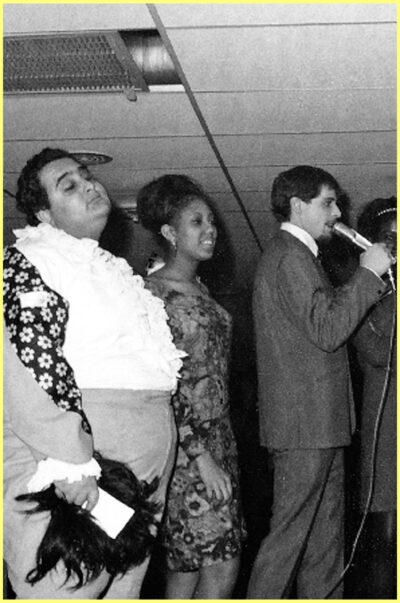
Robbie D., on stage with Telma Hopkins at The Pumpkin in Westland. The great Bernie “Baby Monster,” sans wig, is pictured at left. The year was 1968. (Photo credit: Robbie D.)
After arriving in Detroit and having somewhat settled in, I had been on the air at WCHB for about three months and no one outside the station (except for a few record promoters) had laid eyes on me. There were two big and successful night clubs in Detroit at the time: The Rooster Tail and The 20 Grand, and WCHB produced a show at The 20 Grand every Wednesday and called it Soul Night. That’s where I would make my first public appearance.
I had already developed a strong following in Detroit radio and about 1,200 people showed up to see Mr. Hip Lip, the Man With the Plan, the Master. I was dressed for the occasion, silk and wool and tailored to the bone. Waiting stage right, I was about as nervous as a whore in church — there was no guarantee they were going to like me. When I got my cue I walked to the mic, center stage.
The audience was hostile. There was a lot of noise and none of it was good. In a sudden panic, I looked offstage where Bill Williams, our morning drive DJ, was standing. In a stage whisper, he said, “Just do what you do on the air.”
So I did.
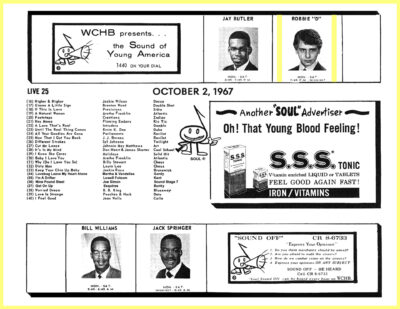 And suddenly, the bad noise from the audience turned good. They were shocked, amazed. But they liked me. I guess they were surprised. When the other DJs at the station referred to me as their “blue-eyed soul brother” no one thought that meant melanin deficient, as well.
And suddenly, the bad noise from the audience turned good. They were shocked, amazed. But they liked me. I guess they were surprised. When the other DJs at the station referred to me as their “blue-eyed soul brother” no one thought that meant melanin deficient, as well.
Then came the second half of a night I’ll never forget. The act I was supposed to introduce happened to be good friends of mine from back in Pennsylvania:
The Magnificent Men, with the #2 record in Detroit at the time, “Peace Of Mind”. Seven white guys with Beatle haircuts. They got the same reception I did. But they did the same thing I did. They opened with James Brown’s boo-Ga-loo and in seconds the crowd were on their feet and cheering. And before their show was over it took about a half-dozen rent-a-cops to drag women off the stage.
So was this a victory of some kind? No. It was just what I had believed all my life. Soul has no color. It was proof that people of various shades could just get together, anywhere, and have themselves a real good time.
Memories. Most good, a few bad . . . .
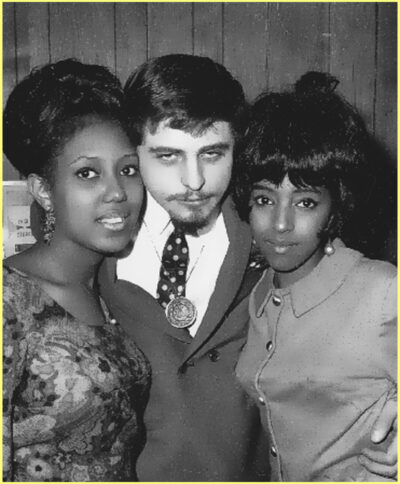
Robbie D., photographed with Stax/Motown session singers Telma Hopkins and Joyce Vincent Wilson at ‘The Pumpkin’ in Westland, circa 1968. (Photo credit: Robbie D.)
And for the next two and a-half years it was that way everywhere I went. Just people having fun. In addition to my weekly appearances at The 20 Grand, I also produced a show of my own at The Pumpkin in Westland. And I proved the impossible was not only possible, but easy. I was warned that there would eventually be trouble because the audience was about fifty percent white and fifty percent black. Adding to that, both of my house bands were white and all the guest singers were black. To quote Gomer Pyle, “Surprise, surprise!” In the hundred or so shows I did there, there was only one fight and it was two white guys fighting over a girl. And people didn’t just hang out with their “own kind”. Everybody mingled and had a great time.
The little things I was able to accomplish in Detroit were a manifestation of what I’ve always believed. While people have some superficial differences, underneath, we’re all the same. My way of thinking, always was, let’s all get along and have a good time together.
My radio program on WCHB wasn’t an act. It was just me, playing the music I loved and having fun. And I think my audience felt that. They must have, because to this day I had the highest ratings in the history of Detroit radio. One out of four people tuned into the Robbie D Show every night!
I finally got the ax from the station after two and a-half years, not because of a drop in ratings, but because of a new program director and a lot of “behind the scenes” shenanigans. But I wasn’t bitter. I went on to be the program director of a station in Pittsburgh and an on-air personality at a station in Philadelphia.
Shared moments, a few wonderful memories . . . .
One of the times I emceed the Motown Review at the Fox Theater, my parents were planning a trip to Detroit. I acquired tickets for them and they were happy to attend. About halfway through the show I asked that the house lights be turned on because I wanted to introduce my parents. I asked them to stand, they did, and with the resounding applause, the audience did, too!
Most everybody, at least from our generation, still remembers Tony Orlando and Dawn. Tony, Telma Hopkins, and Joyce Vincent Wilson (both of Dawn fame) were special, dear friends of mine. Tony Orlando and Dawn were doing a two week engagement at the Holiday House in Pittsburgh, and at the time, we spent a lot of time together. One night, I was able to get my parents great seats up front, along with backstage passes. After the show, an evening of warm affection and admiration started to develop between Telma and my parents.
For a year, Telma and I were the best dating couple on earth. It was the most magical moment and time having her in my life. While I decided to leave radio and pursue other interests, Telma has stayed in the entertainment business and has done well for herself. Tours, television shows, film appearances, and more tours. Her most recent engagement was earlier this year. To her credit, throughout her career she’s managed not to get caught up in all the Hollywood nonsense, and has always kept her personal life very private. Today, we’ve remained friends over the years and I still have the respect, admiration and love for her, and I always will.
Introducing soul legends on stage . . . .
In Detroit, many of the greatest soul acts of the 1960s, aside of Motown, also graced the stage at Detroit’s legendary “soul’ venue, The 20 Grand. Yes, it was more than just showcasing our Motor City R&B talent. Some of the many acts I remember performing there were James Brown, The Righteous Brothers, Joe Tex, The Magnificent Men, Sam & Dave, The Drifters and many, many more.This is hard for many people to understand or accept, but there’s a reason it’s called show BUSINESS. Because it is a business, and what someone does onstage is the product. One of the best compliments you can give someone exiting the stage after their performance is, “great act”. So whether I was working at the 20 Grand, or elsewhere, I loved and admired many, many of the entertainers I was blessed having introduced to many Detroit audiences from the stage, and I introduced so many!
But one stood out. Otis.
One night and after I had introduced Otis Redding and walked back offstage, for the first and only time in my career, tears came to my eyes. Nobody ever affected me like Otis did. I think it was because his performance was part act, and, part REAL. And I’ll never forget the night his plane went down in a lake near Madison, Wisconsin. It was December 10, 1967. Losing Otis, that hit us pretty hard. It was very personal to me and Telma. His sudden death was a shocking, sad moment all of us felt at that time. And yet, nearly 60 years later, his legacy endures. Still lives on.
Final thoughts and comments . . . .
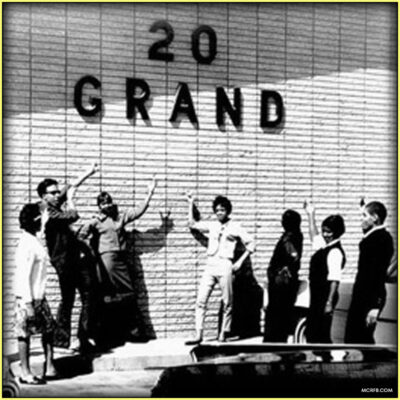 I guess the most important thing I can say about that whole experience, is, that soul has no color. It’s a state of mind. I can eat at Morton’s Steak House or dine at a soul food joint and have just as much enjoyment being at either place. It’s about embracing different cultures, people, places and surroundings and enjoying time in their company.
I guess the most important thing I can say about that whole experience, is, that soul has no color. It’s a state of mind. I can eat at Morton’s Steak House or dine at a soul food joint and have just as much enjoyment being at either place. It’s about embracing different cultures, people, places and surroundings and enjoying time in their company.
My favorite music?
I love it all (except bluegrass, which is one song with 5,000 verses). At 77 years years of age, I’ve been able to experience all kinds of music and develop an appreciation for a lot of it. But my favorite is — and always will be — 1960s R&B. That along with the Doo-Wop music I grew up with. From the Doo-Wop era, my favorite is “I Only Have Eyes For You” by the Flamingos. I have the notes for that song in a frame on a wall in my home.
But more than anything else I’ve done or anywhere else I’ve been, I will always treasure my stay in the Motor City when I was on WCHB in the 1960s. Thank you, Detroit!
Truly it was, and will always be to me, Magic Town.
Sincerely, J. Paul Henderson (aka Robbie D.)
_____________________
JUST RELEASED: Robbie D. WCHB Aircheck (1966–1967)
A rare gem from Detroit’s golden age of soul radio—now part of the USA Radio Museum archive.
We’re honored to present a 22-minute audio aircheck donated by Robbie D. (J. Paul Henderson), featuring snippets from his legendary run on WCHB 1440 during 1966–1967. Held privately for over 58 years, this recording captures the energy, innovation, and charisma that made Robbie D. one of Detroit’s most beloved DJs.
Part One: Raw and rapid-fire—Robbie’s early show with WCHB’s tape echo, a sound he called “a rhyme in time that wasn’t worth a dime.”
Part Two: A sonic upgrade—Robbie and engineer Clarence Ringo pushed for plate reverb, transforming the station’s sound. Robbie also revamped the jingles, giving WCHB a fresh, contemporary edge.
Part Three: The “talking” record—an ad-libbed on-air moment that evolved into a single, selling over 100,000 copies across Detroit and beyond.
[Regarding Part Three: The title was “Precious Memories”, which was a poem Robbie D. originally created and recited on his radio program. For the background instruments, they were all re-mixed and re-equalized. The background track was from “Girl Have Pity”, an early non-hit by the Fantastic Four. The female vocals were done by Telma Hopkins and Joyce Vincent, later of Tony Orlando and Dawn fame.]
This aircheck is more than nostalgia—it’s a time capsule of rhythm, unfettered rebellion, and radio brilliance. Robbie D. didn’t just spin records—he spun magic.
This WCHB audio gem (playable below) is now archived and celebrated at the USA Radio Museum.
WCHB-AM 1440 | The Robbie D. Show | Super Soul Radio Snippets: 1966-1967
Audio Digitally Remastered by USA Radio Museum
_____________________
A Final Reflection: Robbie D. — The Soul of Magic Town
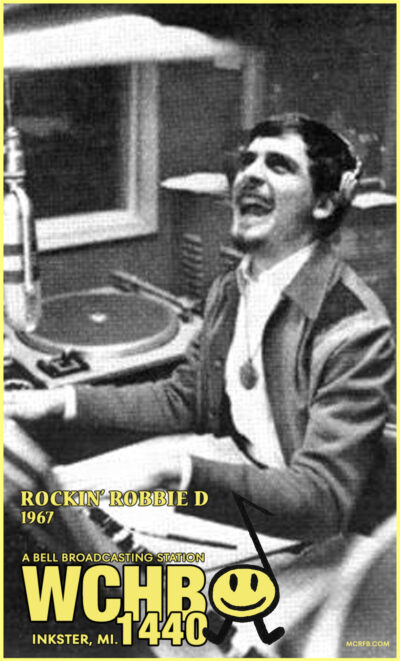 Robbie D. didn’t just play records—he played with expectations, rewrote the rules, and made Detroit groove to a voice no one saw coming. Inspired by the trailblazing Porky Chedwick, Robbie carried the torch of integration and innovation into the heart of Motor City radio. Like Porky, he believed that music had no borders, and soul had no color. But Robbie didn’t just admire his hero—he became one.
Robbie D. didn’t just play records—he played with expectations, rewrote the rules, and made Detroit groove to a voice no one saw coming. Inspired by the trailblazing Porky Chedwick, Robbie carried the torch of integration and innovation into the heart of Motor City radio. Like Porky, he believed that music had no borders, and soul had no color. But Robbie didn’t just admire his hero—he became one.
From his first trembling steps onto the stage at The 20 Grand, where skepticism turned to roaring applause, to the packed dance floors of The Pumpkin Club, where Black and white audiences mingled in joy, Robbie proved that authenticity could break barriers. He introduced legends, emceed Motown royalty, and held the highest ratings in Detroit radio history. One in four listeners tuned in nightly—not for a gimmick, but for a genuine voice that made them feel seen, heard, and alive.
His radio show wasn’t an act. It was him. A blue-eyed soul brother with a jazz heart and a libertarian mind, raised to see people as individuals and treat them with dignity. Whether spinning Smokey Robinson or sharing the stage with Otis Redding, Robbie brought reverence, rhythm, and radical kindness to every moment.
And when he said goodbye to WCHB, it wasn’t the end—it was the beginning of a lifelong legacy. He carried Detroit in his heart, and Detroit never forgot him. His reflections decades later—still sharp, impactful, and full of love—remind us that the best radio isn’t just sound. It’s soul. It’s memory. It’s magic.
Robbie D., real name, J. Paul Henderson, was more than a DJ. He was a bridge, a believer, and a builder of joy. His time in Magic Town was brief, but its impact was eternal. And for all who remember the voice, the vibe, and the vision—Robbie D. is remembered in Detroit as the DJ who, during one of America’s most turbulent decades, helped bridge the racial divide through R&B music, magnetic charisma, and a nightly reminder that soul was the universal language he believed could bring people together.
Thank you, Robbie. You made the music matter. You made Detroit dance. And you infused soul and spirit into the very fabric of Detroit R&B radio that is still remembered today.
_____________________
A Special Acknowledgment to J. Paul Henderson (Robbie D.)
The USA Radio Museum extends its deepest gratitude to J. Paul Henderson, known to Detroit radio fans as Robbie D., for graciously sharing his vivid memories, heartfelt reflections, and personal journey through the Motor City’s soul-infused airwaves.
Three years ago (in 2022), Mr. Henderson left a comment on one of our WCHB tribute posts at our former Motor City Radio Flashbacks website—an unexpected spark that led to something extraordinary. In revisiting that moment, we reached out and invited him to contribute a guest essay chronicling his time at WCHB 1440, Detroit’s trailblazing Black-owned radio station. We were honored when he accepted.
His essay, rich with candor, insight, and emotional depth, offers a rare and powerful glimpse into a transformative era in the ’60s—when music, radio, and cultural connection helped bridge divides and build community. It is a gift to all who cherish Detroit’s radio legacy.
Today, J. Paul Henderson resides in Mooresville, North Carolina, but his voice, his story, and his soul remain forever part of Detroit’s soulful broadcast history.
Thank you, again, Robbie D. You made Magic Town even more magical.
_____________________
A USARM Viewing Tip: On your PC? Mouse/click over each image for expanded views. On your mobile or tablet device? Finger-tap all the above images inside the post and stretch image across your device’s screen for LARGEST digitized view. Then click your brower’s back arrow to return to the featured post.

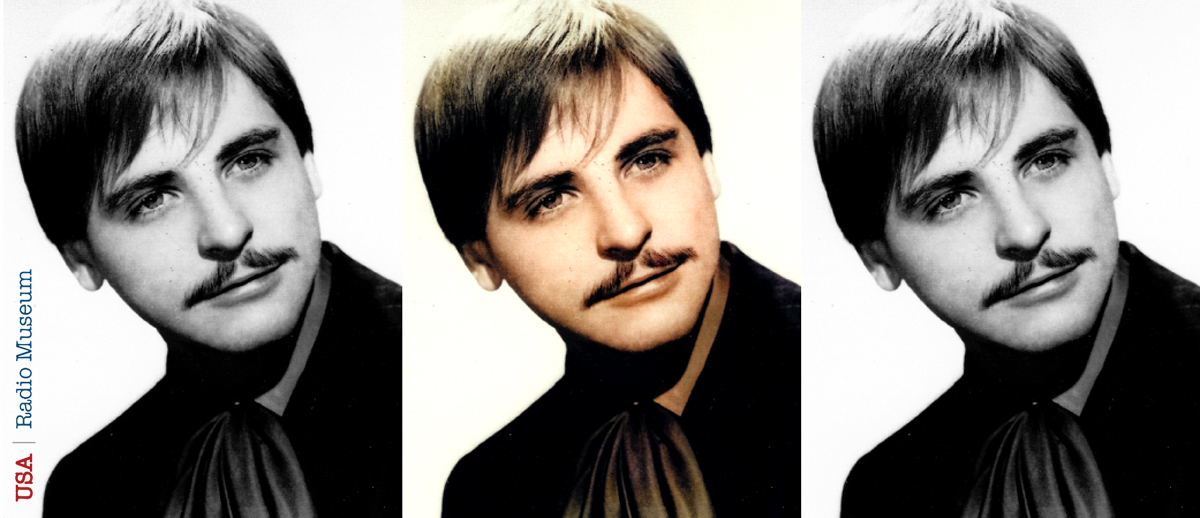
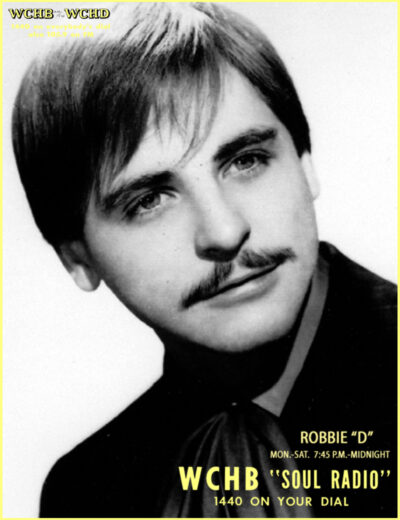
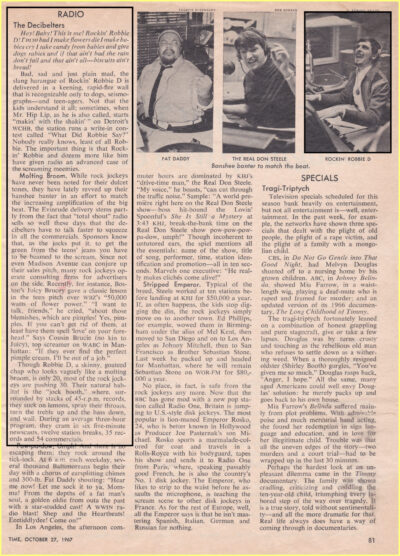
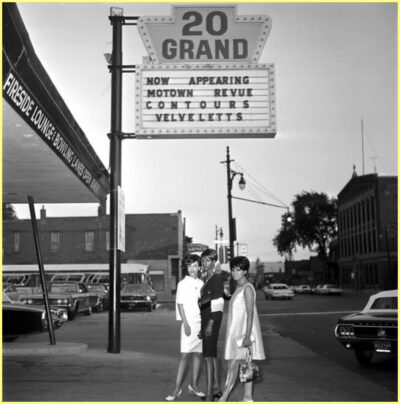
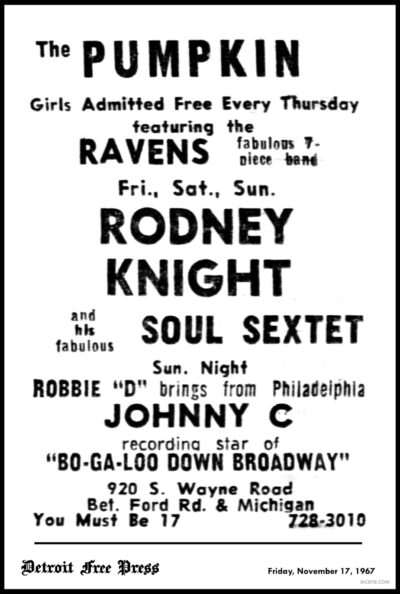
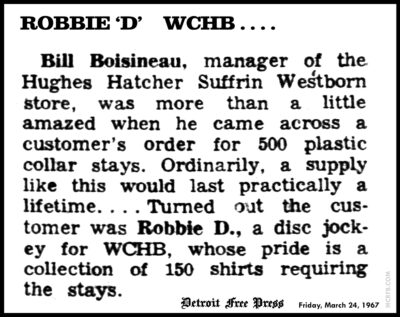
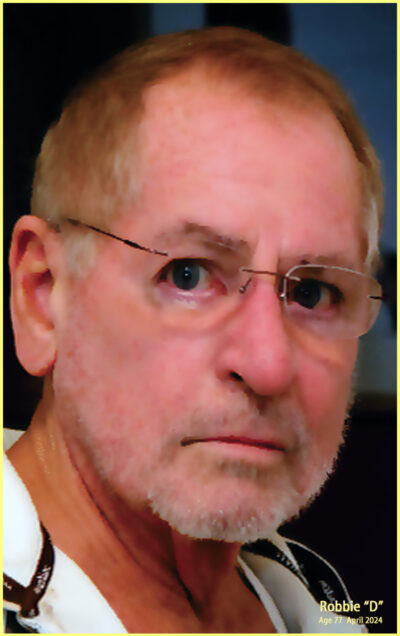
As a lifelong resident of Detroit I well remember listening to Rockin’ Robbie D on WCHB while in junior high school and I missed him when he was suddenly gone. But I also had a lot of family in Pittsburgh and would visit them often. They would tell me about Porky Chedwick and would have me listen. Then I would tell them about Robbie D. While their styles were somewhat different I could tell they were cut from the same cloth. Detroit had its Robbie and Pittsburgh had its Porky, and both cities were blessed.
Subject: Honoring Detroit and Pittsburgh’s Radio Legends
Dear Shylah,
Thank you for sharing such a heartfelt reflection on the special connection between Detroit and Pittsburgh through the voices of Robbie D and Porky Chedwick.
Your memories beautifully highlight how both cities were blessed with iconic DJs who, while distinct in style, shared a deep passion for music that resonated across generations.
It’s inspiring to hear how these legends bridged communities and created lasting memories for listeners like you. Your story enriches our appreciation of the cultural legacy these radio personalities helped shape.
We’re grateful having heard from you and for keeping the spirit of Robbie D and Porky alive with your recent comments.
And, thank you . . . for visiting the USA Radio Museum.
Warm regards,
Jim Feliciano / Jim Hampton
USA Radio Museum
I meant to comment on this Post when it first came out, so I am a little late.
First of all, the very complete, detailed, professional, interesting, and “colorful” in-depth coverage/content of this presentation and Article/Post about “Rockin’ Robbie D” is both amazing and captivating – including the various Exhibits, and the high-quality Audio Clip (which was probably remastered and enhanced from “the old days” by the Author).
Secondly, I have only come to know the featured DJ – “Rockin’ Robbie D” (now “J. Paul Henderson”) – after-the-fact, because I never lived in Detroit. However, I did live and grew up in Pittsburgh, where Robbie D is from, and he was in the High School Class of my younger Sister – which is how I more recently came to know him (I never knew him back in Pittsburgh). Also, in Pittsburgh I was a devoted listener of Radio DJ “Porky Chedwick”, who was Robbie D’s “radio DJ mentor” (“Porky” was also just recently featured here on this USA Radio Museum Website). So with our common interest in, and love for, “Soul” and “Rhythm & Blues” Music, it was a great happenstance that our paths crossed, and that I have gotten to know “Robbie”/”J.Paul” – but this Article/Post, which features the “Detroit Radio Robbie D” back in the day, has given me a much better picture and insight into his colorful and unique Radio career, and his impact on the City of Detroit during his tenure there . . . which was significant. I especially liked the Radio/Audio Clip, and the “Robbie D Show” Promo Songs on there.
Another great job by the USA Radio Museum !!!
Thanks ! / JT Wilks (Philly area)
Subject: Thank You, JT – Your Reflections Mean the World
Hi JT,
Thank you so much for your generous and heartfelt comments on our Robbie D. tribute feature. Late or not, your reflections are deeply appreciated—and beautifully in tune with the spirit of the USA Radio Museum.
We’re thrilled that the presentation resonated with you, especially the audio restoration and the “Robbie D Show” promo clips. It was a joy to remaster those segments and bring the soul of 1960s WCHB back to life. Robbie’s voice carries a kind of magic that transcends time, and we wanted that to shine through.
Your Pittsburgh connection adds a wonderful layer to this story. Knowing that Robbie D. was in your sister’s high school class—and that you were a devoted listener of Porky Chedwick—makes your perspective especially meaningful. Porky’s legacy as a trailblazer in soul radio is monumental, and we’re honored to have recently featured him as well.
The fact that both Robbie and Porky helped shape the soundtracks of their cities—and now share space in our museum’s digital halls—is a testament to how powerful and personal radio history can be.
We’re grateful for your support and your shared love of soul and R&B. It’s voices like yours that help keep these memories alive and meaningful for future generations.
With appreciation,
Jim Feliciano
USA Radio Museum